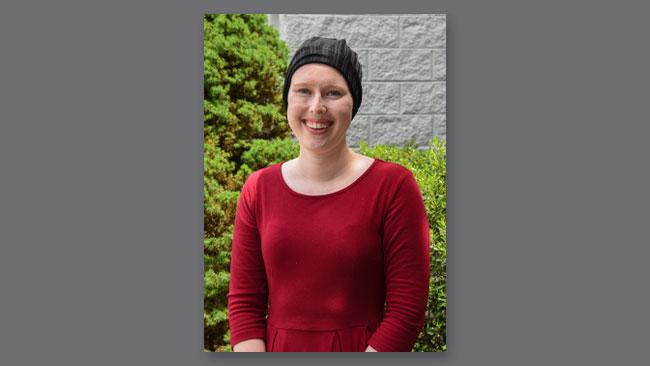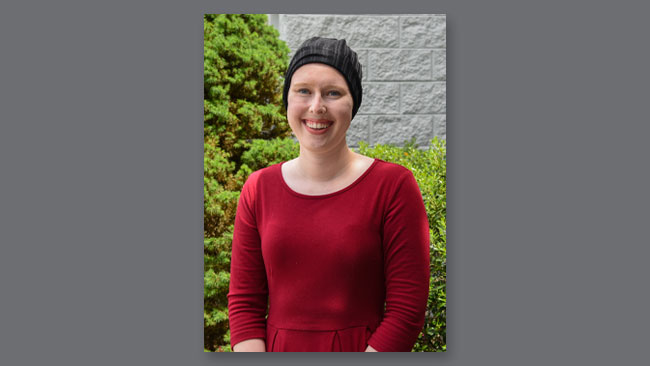
Anyone who has been to medical school knows how challenging it can be, both intellectually and physically. So, when Casey Harvey reached the beginning of Block 4 of her first year at VCOM-Virginia—in April 2023—and started feeling a little run down, it was easy to brush the symptoms off as being related to the stress of her academic program. But the symptoms got progressively worse and by the middle of Block 4, she realized she needed to do something.
So, what do you do when you’re a medical student and you don’t have a local doctor? You order your own lab tests through a commercial lab, of course. The results were worse than she imagined, and she needed help interpreting them, so she sent them to her father, an emergency medicine DO. Her father had to deliver the devastating news: Casey had leukemia.
Casey headed to UVA Health Charlottesville, about two and half hours from Blacksburg. The official diagnosis was acute myeloid leukemia, and her oncologist told her that she would not be able to return to school because her treatment needed to begin right away. “That is when the seriousness of the situation really hit,” she remembers.
The experience of being a patient with a life-threatening illness can be particularly difficult for a young adult like Casey. She completed her civil engineering degree at Virginia Tech in 2017 and worked in the field for several years before coming to VCOM. Her cancer diagnosis meant moving back home and relying on her parents. “It can feel like taking a step-backwards in life,” she says. “But my family was hugely supportive, and we tried to find a happy middle ground between support and independence.”
Her VCOM classmates were also supportive, sending so many letters that it took until the end of her treatment to finish reading them all. In that, Casey learned a valuable lesson: “Support is often a marathon, and not a race.”
Casey spent nearly a month in the oncology unit at UVA and continued outpatient treatment until January of this year, when she had her official “end of treatment” biopsy. Casey then returned to the VCOM-Virginia campus, picking up basically where she left off—though she’s now a member of the Class of 2027 instead of the Class of 2026. “I’m very grateful to VCOM for all their help while I was gone and for making my return fairly seamless,” she says.
But the end of treatment has come with challenges. “It seems obvious, but I was surprised end of treatment does not mean a complete return to normal,” she says. “I am still in physical recovery mode and, equally as important, mental recovery mode. It’s like entering a new phase of the cancer journey, and I’m still learning to navigate the post-cancer world.”
To help her move forward, Casey has connected with several cancer survivors who returned to rigorous academic careers. Their advice? Focus on school and health. Extracurricular activities must take a back seat. That has been hard for Casey, who was involved in many VCOM activities and organizations before her diagnosis. “I’ve had to intentionally set those aside for the time being,” she says. “I hope as I get further along in my recovery, I can start adding things back and returning to the full school experience.”
Her treatment journey taught Casey a lot about the healthcare system, and one of the biggest lessons she learned is just how complicated the system is. She went into the experience believing that, as a medical student from a medical family, she was an informed consumer. “But I was very much a fish out of water,” she observes. The difficulty was further complicated by the fact that she had to start treatment immediately. “There wasn’t a lot of time to acclimatize to being a patient. Everything from insurance to support resources had to be learned as I went.”
She notes that there is a lot of burden on the patient and their family. They must learn about their disease and its treatment, as well as how to navigate the system.
I learned there are a lot of resources out there to help patients, but they can be difficult to find. This is why social services are such an important part of healthcare. They are an immense resource for patients, helping to connect them with programs and reduce the burden on the patient.
Casey knows that her experience as a patient is going to influence how she practices medicine going forward. She says her oncologist at UVA took the time to explain the diagnosis to her—what she describes as a “crash course”—and it was invaluable in helping her feel less afraid of the journey she was facing. “As a physician, I want to embody that same teaching mindset with my patients,” she says.
She also knows that there is often a mismatch between what the physician is worried about and what the patient is worried about. Physicians are thinking about treatments. Patients are thinking about the cost and accessibility of treatment, what the diagnosis means for school and work and the impact on other responsibilities. “I remember my oncologist’s voice fading away (like the teacher in Peanuts) and all I could think about was missing school,” she says. “Physicians cannot fully eliminate these competing priorities, but it is important to make sure they are acknowledged and, when possible, addressed.”
Casey’s experience as a patient has reaffirmed her interest in hospital-based medicine, and she’s currently thinking about pursuing emergency medicine or critical care.
Want to Make a Difference?
If you’re inspired by her story and want to make a difference in someone else’s treatment, Casey encourages you to register through the National Marrow Donor Program to be a stem cell donor.
“Through my treatment, I’ve met several people who needed transplants and they shared with me the difficulties of finding a match,” she says. “Registering only takes a cheek swab, and you could save a life!”
Visit bethematch.org for more information.
